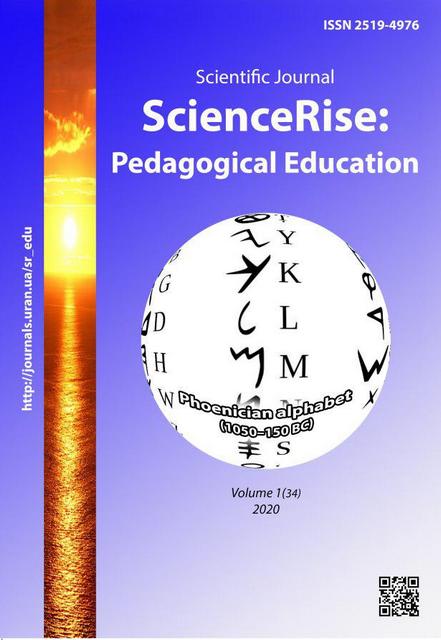Methods of forming leadership life of young people as a prerequisite for continuous education
DOI:
https://doi.org/10.15587/2519-4984.2020.193432Keywords:
continuing education, country security, leadership qualities, human capital, self-motivation, self-developmentAbstract
In this article the author examines a possibility of motivation of the personality of a young human to continuous education through forming and development of leader qualities. Leader positions of young people are instrumental in bringing a human in the permanent update of knowledges and processing of a large array of information, in fact leadership, as well as professional skills needs permanent self-development for constancy in firmness of the position and dynamics in the practical application of the noted quality. We examine the leading mechanism of acquisition of leader qualities as a pre-condition of continuity of education of young people through the glass of psychological and pedagogical active, creative methods, each of which provides the proper stage of development of high-quality leadership.
The author accents attention on continuous education as on the method of maintainance, development of national cultures and also values, common to all mankind. Many problems, appeared in Ukraine, are a result of impudence and indifference of habitants. And unfortunately, today there is a considerable part of young people, indifferent to the events which take place, including through ignorance, without a regard to large possibilities of modern technologies.
Such leading methods as: training, creation of hubs, application of workshops, methods «Six hat», «World cafe», «Hamburger», and also: e-learning, m-learning, u-learning, change of workings areas, inverted class, autonomous group are examined; the necessity of creation of youth schools of the innovative character as «Youth schools of social activity» is grounded
Except for it, the author accents attention on the importance of creation of the modern public space (platforms) for increasing the general level of educational and social activity of habitants of the correspondent region, on which innovative technologies of social formation and development of an active position of young people are directed in accordance with the European standards through the use and addition of the human capital.
In the article there are examined values of forming and development of talents of leadership in a rural locality in particular, taking into account the local features of development of a region, categories of children, their interests and absence or presence of resources for self-realization of our children. A complexity and systematic character of co-operation of such mechanisms allows to get a practical result and provide a high-quality pre-condition to the motivational process of continuous formation of a personality as a basis of safety direction of the country.
In the context of continuity of the educational process, the labor potential realization increases, the likelihood of gaining new luck in the professional experience and advanced training increases, that in its turn reduce migration processes. And the author offers the continuity of education through the formation and development of leadership
References
- Biletsky, O. V. (2016). The Formation and Using of Human Capital in the Innovation Economy. Vinnytsia, 23. Available at: http://abstracts.donnu.edu.ua/article/view/1821/1854
- Davydov, P. H. (2010). Bezperervna osvita – vymohy chasu chy nova filosofiia osvitnoi diialnosti. Visnyk Donetskoho natsionalnoho universytetu ekonomiky i torhivli im. M. Tuhan Baranovskoho. Seriia «Humanitarni nauky», 2, 170–175.
- Kontseptsiia vprovadzhennia media-osvity v Ukraini. Instytut sotsialnoi ta politychnoi psykholohii Natsionalnoi akademii pedahohichnykh nauk Ukrainy. Available at: https://ms.detector.media/mediaosvita/post/11048/2010-09-29-kontseptsiya-vprovadzhennya-mediaosviti-v-ukraini/
- Lozovetska, V. T. (2012). Do pytannia onovlennia profesiinoi osvity. Pedahohichna i psykholohichna nauky v Ukraini. Kyiv: Pedahohichna dumka, 134–142.
- Gritton, J. (2011). Leadership lessons from Pandora and beyond. Experiential Learning in Virtual Worlds: Opening an Undiscovered Country. Oxford: Inter-Disciplinary Press, 13.
- Jameson, J. (2006). Leadership in Post-Compulsory Education: Inspiring Leaders of the Future. David Fulton, Adult education, 218.
- Talanchuk, P. (2014). Navchannia protiahom zhyttia – sertsevyna suchasnoho osvitnoho protsesu. Available at: http://vnz.org.ua/statti/7038-navchannja-protjagom-zhyttja-sertsevyna-suchasnogo-osvitnogo-protsesu-petro-talanchuk
- Memorandum nepreryvnogo procesa obrazovaniia evropeiskogo soiuza (2006). Adukatar, 2 (8), 24–27. Available at: http://adukatar.net/wp-content/uploads/2009/12/Adu_8_Pages_24-27.pdf
- «Shist kapeliukhiv»: pryiom hra dlia rozvytku krytychnoho myslennia (2018). Available at: https://naurok.com.ua/post/shist-kapelyuhiv-priyom-gra-dlya-rozvitku-kritichnogo-mislennya
- Rizun, V. V. (Ed.) (2012). Mediaosvita ta mediahramotnist. Kyiv: Tsentr vilnoi presy, 352.
Downloads
Published
How to Cite
Issue
Section
License
Copyright (c) 2020 Tatyana Kostieva

This work is licensed under a Creative Commons Attribution 4.0 International License.
Our journal abides by the Creative Commons CC BY copyright rights and permissions for open access journals.
Authors, who are published in this journal, agree to the following conditions:
1. The authors reserve the right to authorship of the work and pass the first publication right of this work to the journal under the terms of a Creative Commons CC BY, which allows others to freely distribute the published research with the obligatory reference to the authors of the original work and the first publication of the work in this journal.
2. The authors have the right to conclude separate supplement agreements that relate to non-exclusive work distribution in the form in which it has been published by the journal (for example, to upload the work to the online storage of the journal or publish it as part of a monograph), provided that the reference to the first publication of the work in this journal is included.








